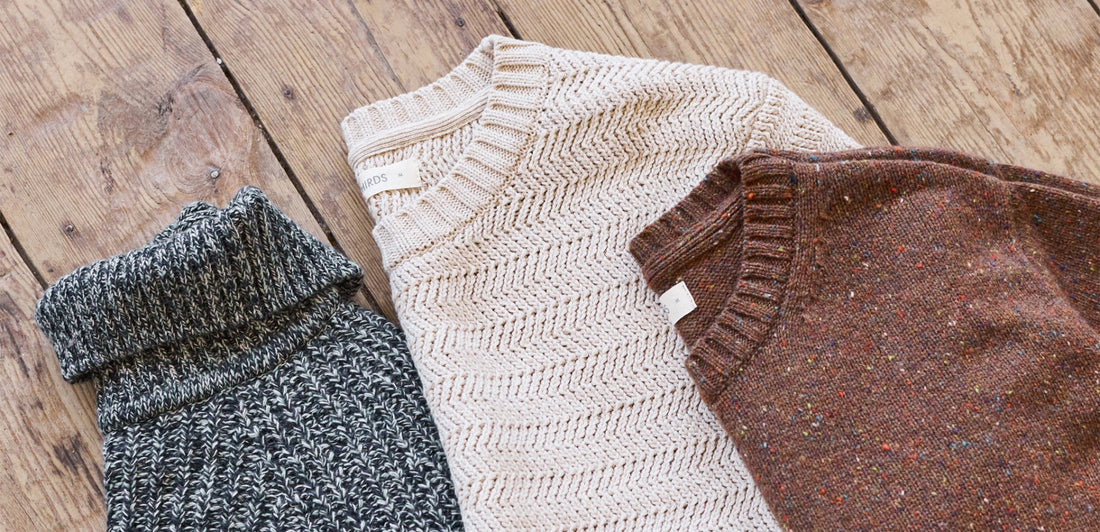We’ll level with you: no fabric lasts forever BUT there are a few essential care tips that can keep your favourite fabrics (and garments) in pristine condition for years to come. Preserving our clothing is an important sustainability goal, because consumers are throwing away more clothing than ever before. In the UK, the average lifespan of a garment was estimated to be just 2.2 years in 2019.
How To Care For Sustainable Fabrics
Of course, care information varies from fabric to fabric. That’s why we’re channelling the insights of our experts and sharing everything we know about treating individual materials! Learn how to show some proper love to your organic cotton tees, linen tops, wool knits, and recycled garments with the information below.
Organic Cotton or Cotton
The majority of our cotton is organic with a tiny percentage coming from cotton deadstock (leftovers that we turn into beautiful limited edition products).
Care tips. Wash by hand two or three times before using a machine to reduce shrinking. Wash organic cotton garments inside out. If worried about mixing colours, use a clothing bag to separate them in the machine. Use a normal or mild detergent and try not to overdo it! Do. Not. Use. Bleach. Always air dry, or tumble dry on a low heat. Flat-drying is best.
Water temperature: 30 degrees or cold.
Softener? Not recommended.
For Extra Sustainability Points
Stick to the cold setting. When washed well, organic cotton can do without the heat.
Wool
Wool is a resilient fabric that doesn’t need much worrying over. In fact, the best policy is to wash it as little as possible (which is more sustainable, too).
Care tips. Treat quality wool by spot cleaning it and letting the knit take air. When the time comes, turn the garments inside out and use a washing machine on the delicate/wool setting. Put it in a mesh bag first. Once washed, press or squeeze your wool garments instead of wringing them out. Avoid clothing pegs - dry flat instead. For more knit tips, see here.
Water temperature: Maximum 40.
Softener? No.
For Extra Sustainability Points
Wool can last for years and years and makes for the kind of garments that can acquire “emotional durability”. Fall in love with your knits and you’ll never need a new one.
Linen
This fabric is made from flax and is antibacterial and stain-repellent. As such, it gets clean at a low heat.
Care tips. Wash linen using a program for delicate clothes. Better to use a mild soap/detergent. For more structured garments (jackets) we do recommend dry cleaning. If using a tumble-dryer (on cold, please!), best to remove the linen from the dryer while it is still humid to avoid stiffening. You can also iron your linen while it is damp. For more tips, see here.
Water temperature: 30 or cold.
Softener? White vinegar will do.
For Extra Sustainability Points
Use a natural detergent. It will protect the fabric and the environment.
TENCEL™ Lyocell
A revolutionary sustainable material, TENCEL™ has been nicknamed tree silk for its delicate and smooth texture.
Care tips. It’s best to hand wash TENCEL™ Lyocell and then to press out the moisture (eg. against the bath) before leaving it to flat dry. Always use cold water. And if encountering wrinkles, we recommend steaming the garment with an iron. These tips also apply to the fibre’s cousin, TENCEL™ Lyocell X REFIBRA™.
Water temperature: ideally 20 degrees (cold).
Softener? It’s soft enough already.
For Extra Sustainability Points
When/if the time comes to dispose of it, TENCEL™ Lyocell will biodegrade.
LENZING™ ECOVERO™ Viscose
Sustainable viscose is soft, antibacterial and highly absorbent. It reduces the environmental impact of regular viscose by as much as 50%.
Care tips. Hand wash. To remove stains: carefully rub the stained area with a mild detergent to not damage the fabric. If machine washing, use a delicate cycle and wash on the reverse side to maintain colour brightness. We tend to flat-dry our LENZING™ ECOVERO™ Viscose styles.
Water temperature: ideally 20 degrees (cold).
Softener? Not recommended.
For Extra Sustainability Points
When/if the time comes to dispose of it, ECOVERO™ will biodegrade.
Recycled yarns
Recycled yarns can be treated similarly to their origin materials (eg. recycled cotton = cotton, recycled wool = wool), however the key to making them last is to wash them less often.
Care tips. Better to hand wash it but if machine washing, use a cold setting. To remove a stain, wash only the affected areas delicately with soap and a sponge. Air dry the garment, don't tumble dry. Put your garment on a hanger when drying to avoid ironing.
Water temperature: 30 degrees or below.
Softener? As desired. With wool, best not to.
For Extra Sustainability Points
Use a bag that catches microfibers.
Swimwear
We use two sustainable blends in our swimwear, ECONYLⓇ regenerated polyamide (with elastane) and SEAQUALⓇ recycled polyester.
Care tips. Air dry as often as possible instead of washing. While doing so keep your swimwear out of direct sunlight to prevent colour fading. Wash with other synthetic fabrics or garments. Avoid tumble drying so as not to harm the fibres.
Water temperature: 30-40 degrees.
Softener? No.
For Extra Sustainability Points
Use a bag that catches microfibers.
What is the most environmentally friendly way to wash clothes?
The most environmentally friendly way to wash clothes is to use cold water. Unless advertised otherwise, your machine will use roughly 75% of its energy just to heat the water! So opting for the cold setting significantly reduces your carbon footprint. We’d also really encourage reducing the amount of laundry you do by airing clothes out, spot cleaning, or even experimenting with an alcohol spray (note: we haven’t tried this hack ourselves, so proceed with caution)!
You may also be wondering if washing by hand is more environmentally friendly. While it’s quite difficult to measure, it will be gentler on your clothing which will help it last much longer. If your machine doesn’t have an eco rating, it will undoubtedly be more sustainable than machine washing.
TENCEL™, LENZING™, REFIBRA™ and ECOVERO™ are trademarks of Lenzing AG.








